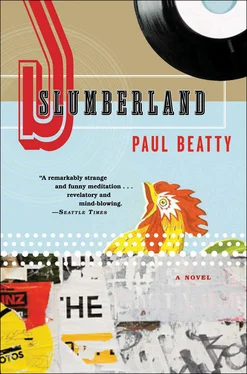The left-handed explanation is partially true. To compensate for a right hand so useless that it could barely place a record on the spindle, I’ve experimented with every configuration of gadgetry and form. Both decks on one side, no cross fader, hamster style, reverse hamster, S-shaped and straight tone arms — but even after my right hand became dexterous enough to perform the perfunctory party skills such as stabs, cuts, and scratches, I still felt unsettled behind the tables. Standing behind my decks was like sleeping in somebody else’s bed.
The closest my work gets to ritual is the cleaning of the records. Hands gloved in thin white cotton, I treat the rare acetate 78s and the reissue-vinyl LPs with equal amounts of welcome-tothe-Waldorf-Astoria doorman respect. I follow the instructions on the cleaning fluid as prescribed. Removing static, crackle, and pop-producing dust particles and/or oily contaminants by handling the discs by the edges and labeled surfaces only.
I was cleaning an especially dirty record, something I never played, Earl Klugh, maybe, when it dawned on me why I was so uncomfortable behind the turntables: The records spin in the wrong direction. They turn clockwise when every other naturally occurring vortex, from spiral galaxies to hurricanes to flushing toilets to red-white-and-blue Harlem Globetrotter basketballs, spins counterclockwise. Looking at the Earl Klugh album, the dust particles clinging to the shiny black vinyl like stars to the desert sky, I realized that in my hand I held a dusty twelve-inch microcosm of the Milky Way. The LP is a grooved mini-whirlpool down which the needle spirals to produce sound. In the case of Earl Klugh, saccharine crap, but sound nonetheless. So I turned my turntables upside down. Now my records spin counterclockwise in concert with the spinning universe itself.
My explanation impressed Klaudia. She placed a heavy hand on my shoulder. It seemed to be pressing down on me, forcing me into place as if I were a misshapen puzzle piece. In the new jigsaw Germany, where does this strange one go? Her fingers, nails unpainted, cuticles chewed raw, dug into my shoulders.
King Crimson still had another three quarters of an inch of playing time left. I started to give some thought to the next song. When I play in front of a crowd, I don’t sample. I play the entire recording. Live sampling is like taking a quote out of context.
I wavered between Brick’s “Dazz,” “Children of the Sun” by Mandrill, and readdressing my narcosis subtext with “Riding High” by Faze-O. Klaudia’s hand slid off my shoulder. But she didn’t go away. I settled for “Children of the Sun.” For a plump woman she had a long neck, and I wanted to run the palm of my hand against the grain of blonde fuzz on its nape. I suppose she wanted me to ask her name. But I didn’t want to know it. I wanted to know why the dogs in this city didn’t bark, and that was about it.
I drained my beer, mixed in the chimes from “Children of the Sun” a shade behind the pounding downbeat of King Crimson’s Mellotron, and realized there was something I did want to know.
“Do you know where I can see the sunset?”
“The sun is hard to find here. Does that go on your nerves?”
“Well, if you think of a place. .”
Klaudia stuck out her hand and finally introduced herself. I gave her my card, making a point of handing one to her boyfriend, Horst, a bald-headed, rugger-nosed translator who looked like an IRA terrorist who moonlighted as a mountain crag between car bombings and kneecappings. He introduced himself by slipping a beer in my hand and an arm around Klaudia’s waist. Maybe her sidelong glances were just that, sidelong.
Two days later, she called.
“Hallo? Please, may I speak to DJ Darky?”
She wasn’t frumpy enough for me, too ladylike and, even at a Rubenesque 165 pounds, too skinny. I’ve always been slightly disappointed that German women ran thin. I expected buxom prison guards with flabby arms, fullback thighs, and mean streaks as wide as their broad, flat, Aryan asses.
“I was in a record shop when I found a song I thought you might like, an old GDR propaganda tune from the early sixties, ‘Affenschande (Amerika stopft Affen in die Satelliten).’ Would you like to know the English?”
I speak German but sometimes it’s best never to let them know I spreche the Sprache . It’s safer that way.
“In English the title is something like, ‘Crying Shame (America Stuffs Apes in the Satellites)’ or so.”
“That’s funny.”
“Yes, it is. I also thought of a place where we can see the sunset as well. Shall I give you the record then?”
On the evening of my first Berlin sunset, only the thriftiest East Berliners hadn’t spent the complimentary one-hundred-deutschmark note they received as Bundestag howdy-dos to the Free World. When we met that night at the base of the Fern-sehturm, Klaudia von Robinson still had hers. Fernsehturm is the first German word any Berlin émigré learns. Built to commemorate the launching of the Sputnik satellite, the Fernsehturm is a forty-story television antenna that resembles a Soviet-era ICBM. Since the late fifties every guest worker, asylum seeker, and honorably discharged black American male with a predilection for white women has pointed at the city’s tallest structure and asked, What the fuck is that?
Standing at the base of the TV tower, Klaudia turned the bill over in her hands, contemplating the strange-looking money the way Jack must have contemplated his magic beans. The elevator doors opened. The bean stalk sprouted. We entered wondering what magical adventures lay ahead. Inside the elevator a placard written in German, Russian, and English said the elevator would ascend two hundred meters in thirty seconds.
The Fernsehturm has always frightened me. It looks operational. I’m convinced the tower is the Communist Trojan Horse wheeled up to the Brandenburg Gate as a gift and that, somewhere deep in the backwoods of Saxony, in an underground bunker hundreds of feet beneath the Hungarian oak, firethorn bushes, and black bears, a top-secret cadre of East German scientists still fights the Cold War, memorizing the day’s launch codes over breakfast. Swie-Zulu-Foxtrot-sieben-sieben-Whiskey-fünf. Mach mit, Kamerad. Mach mit .
Klaudia, sensing my nervousness, pointed to the face on her banknote.
“Who’s Clara Schumann?”
“She was a pianist, composer.”
“Where was she born?”
“Leipzig, I think. She was running with Brahms and them, so I’m guessing she was born in 1820 something. Maybe a little earlier.”
“Ha, an Ossie, on the West’s money.”
“In 1820 it wasn’t East Germany, it was eastern Germany. Wait, it wasn’t even Germany, it was Prussia or some shit.”
“Ja, das stimmt.”
“Who was on the one-hundred deutschmark in the GDR?”
“Karl Marx.”
At two hundred meters we stepped into the Telecafé, the revolving restaurant about two-thirds up the tower. Revolving restaurants are the world’s slow-spinning sociocultural centrifuges. The g-force they exert is slight, but enough to separate modernity from kitsch, communism from capitalism, love from lust. The hostess seated us at a cozy linen-covered table across from the wait station. The busboy jammed his hand into the forks, then the knives, then the spoons. The sound of the parting silverware was beautiful. I tried to fight the urge to tape it, thinking that recording random sounds would be rude on a first date. But the sound won. It always does.
Klaudia too respected sound. Quietly, she waited for the waiter to finish rummaging through the cutlery, then I switched the machine off.
“Kannst du wechseln?” she asked, waving her cherished bill in my face.
Читать дальше












